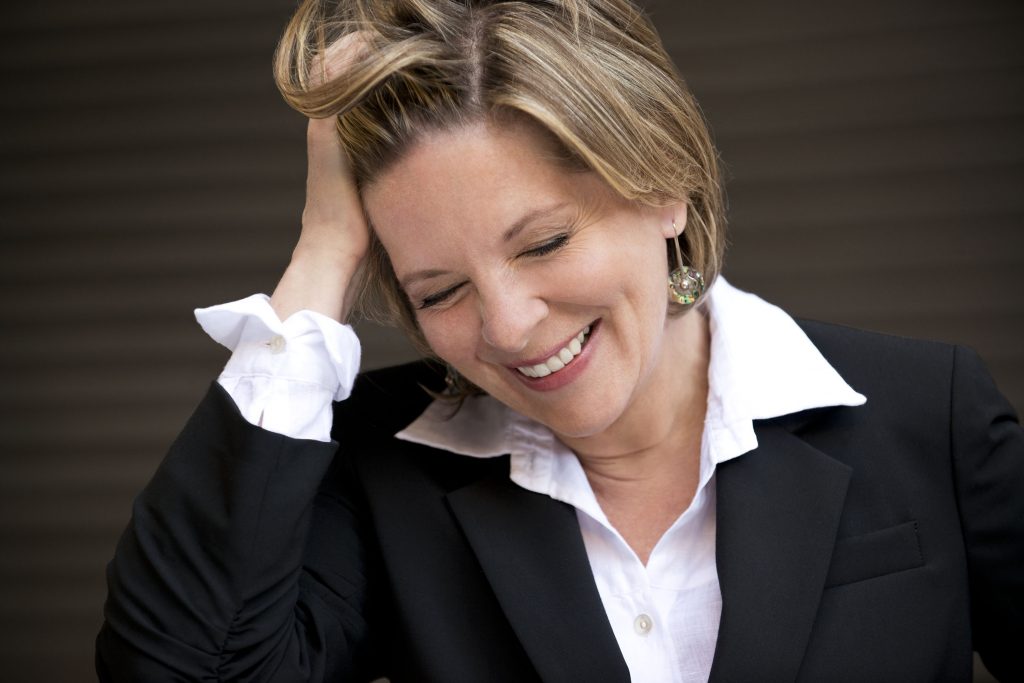Soprano Susan Narucki and Friends Offer Probing New Music for the Voice at the La Jolla Athenaeum
As groundbreaking as Arnold Schoenberg’s Pierrot Lunaire was in 1912, the work’s prominent use of voice and poetry did not set a huge precedent for avant-garde composers who followed in Schoenberg’s wake. And once composers got hold of electronic components, the human voice did not appear to be a winning musical component unless, like Karlheinz Stockhausen in his classic Gesang der Jünglinge, it could be recorded and manipulated electronically.

Susan Narucki [photo courtesy of the artist]
Narucki cast a wide net, selecting works by lions of the avant-garde such György Kurtág and Roger Reynolds as well as accomplished younger composers such as Anna Thorvaldsdóttir and Sarah Nemtsov. She opened the program with a provocative and touching song cycle Dulzuras from 2004 by the Columbian born composer Alba Potes (she has pursued her musical career in New York City). While Dulzuras clearly follows in the great tradition of the Spanish language song cycle championed by Manuel de Falla, Fernando Obradors and many others, there was nothing retro about it other than its celebration of heightened emotion through the medium of the voice.
To say that Narucki was accompanied by classical guitarist Pablo Gómez Cano would egregiously understate his role in Dulzuras—and the rest of the program as well. Potes crafted distinctly independent yet equal parts for both the soprano and the guitar, and the complex interaction between their angular, often leaping lines underscored the emotional quotient of the poetry by Dulce Maria Loinaz. The middle canción of the cycle’s five songs Potes wrote for soprano alone, which Narucki communicated with a rare combination of heightened angst and exquisitely disciplined execution.
Toshio Hosokowa’s shorter song cycle Renka I (1986), based on three Japanese texts of haiku brevity, gave the guitar the more aggressive role, displaying vibrant plucked tones, strong bent pitches and the occasional edgy rasgado strum, executed by Gómez Cano with sure conviction and immaculate clarity. Hosokowa made the soprano line intentionally more understated that the guitar, but that did not prevent Narucki from suggesting the passion just below the surface of her part.
In her 2010 “Rain,” Anna Thorvaldsdóttir left any vestige of the song cycle behind, crafting an alluring sonic cloud that treated the short text as a series of vowels to be dissected one at a time and colored by the singer. The composer added lucid, floating single tones by flute and bass flute, deftly supplied by Michael Matsuno, to Gómez Cano’s guitar, as well as a low-pitched electronic rumble, manipulated offstage by Christopher Warren, that functioned like a basso continuo. If this description sounds overly mechanical, be assured that Thorvaldsdóttir’s “Rain” communicated a compelling sense of austere beauty.
Two unaccompanied vocals revealed each singer’s prowess maintaining complex vocal peregrinations without the aid of a fixed-pitch instrument. Narucki handled Kurtág’s 1998 “Einige Sätze aus den Sudelbüchern Georg Christoph Lichtenberg,” a grab-bag of antic aphorisms, with enviable panache, and Kirsten Ashley Wiest sang British composer Nicola LeFanu’s two mysterious songs from A Penny for a Song with a light, sweetly focused soprano appropriate to their equivocal air.
Gómez Cano offered two guitar solos, Édgar Guzmán’s flashy 2004 “Apnea,” a catalogue of extended techniques that ambitiously employed nearly every part of the guitar as a sound source, and a more serious and rewarding sonic study by Roger Reynolds, his 2009 “imageE/guitar.”
To cap this bold array, Wiest performed Sarah Newtsov’s 2016 “Träne,” simultaneously singing its chant-like recitative of a cryptic German poem while adding percussive accents from a set of suspended gongs and one very large cowbell. Whatever sonic image comes to your mind after that description, I assure you it was more subtle than that.


